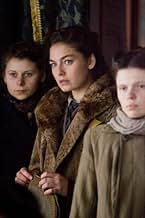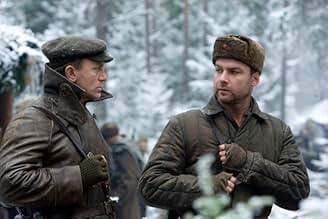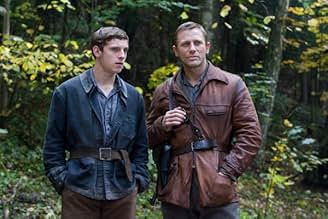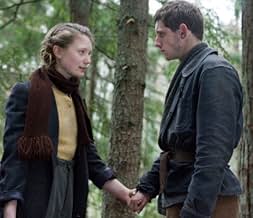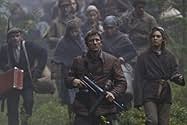Jewish brothers in German-occupied Eastern Europe escape into a Belorussian forest, where they join Russian resistance fighters, and endeavor to build a village, in order to protect themselv... Read allJewish brothers in German-occupied Eastern Europe escape into a Belorussian forest, where they join Russian resistance fighters, and endeavor to build a village, in order to protect themselves and about one thousand Jewish non-combatants.Jewish brothers in German-occupied Eastern Europe escape into a Belorussian forest, where they join Russian resistance fighters, and endeavor to build a village, in order to protect themselves and about one thousand Jewish non-combatants.
- Director
- Writers
- Stars
- Nominated for 1 Oscar
- 2 wins & 5 nominations total
- Director
- Writers
- All cast & crew
- Production, box office & more at IMDbPro
Featured reviews
"Defiance" is a very entertaining, exciting, suspenseful, and inspirational film about a tough topic: the Holocaust. Its many action sequences are well-paced and well-motivated. You know exactly why Tuvia Bielski (Daniel Craig) breaks into a home and points a gun at a man in front of his family. Daniel Craig and Live Schreiber are terrific as Tuvia and Zus Bielski, who lead a band of Jewish forest partisans during World War Two, thus saying over a thousand lives.
The movie is not perfect. Characters speak English with Slavic accents. In other scenes, they speak Russian or Belarusian. Craig and Schreiber manage very good Slavic accents, both when speaking English and when speaking the Slavic languages, but Craig occasionally lapses into his English accent when speaking English. Female characters are not particularly well drawn, or given much to do. While this film is very good, it doesn't have the production values to be a timeless classic like "Schindler's List." The movie is controversial. Most of the controversies are shallow relative to the most important facts at hand. Many of those attacking this movie have axes to grind, including current events in the Middle East or feuds between Poles and Jews. The most important fact is this: the Nazis committed a genocide of six million Jews. In the midst of this Satanic nightmare, the Bielskis managed to save over a thousand Jews. That's the main, and absolutely true, point here, and it should not be lost in bickering over details.
Compared to other treatments of the Holocaust, this film is fair. It doesn't show Slavic peasants as uniformly Jew-hating collaborators. Nazis, not Slavic peasants, were the authors and perpetrators of the Holocaust. Some occupied peoples collaborated, often out of fear and for financial gain or as payback for old grudges. Some occupied peoples did everything they could to help Jews, as does a Belarusian peasant in this film.
The Bielskis were not immaculate. They did summarily execute captured Germans, as shown here. They did raid peasants for provisions, as shown here. They did work with the Soviets, but so did Uncle Sam. Remember that photo of FDR and Churchill smiling with Stalin at Yalta. The Polish IPN institute is investigating charges that members of the Bielski partisans, but not the Bielskis themselves, participated in the 1943 Soviet massacre of 128 people in Naliboki. Aron, the youngest Bielski brother, was, in 2007, accused of defrauding an elderly Polish woman. These failures of the Bielski brothers to be perfect in no way lessen their achievement, any more than any failure to be perfect lessen any hero's achievement. Again, in the face of genocide, the Bielski brothers managed to save over a thousand people. Were they perfect? No. Were they admirable, heroic, and worth learning about? Absolutely yes.
The movie is not perfect. Characters speak English with Slavic accents. In other scenes, they speak Russian or Belarusian. Craig and Schreiber manage very good Slavic accents, both when speaking English and when speaking the Slavic languages, but Craig occasionally lapses into his English accent when speaking English. Female characters are not particularly well drawn, or given much to do. While this film is very good, it doesn't have the production values to be a timeless classic like "Schindler's List." The movie is controversial. Most of the controversies are shallow relative to the most important facts at hand. Many of those attacking this movie have axes to grind, including current events in the Middle East or feuds between Poles and Jews. The most important fact is this: the Nazis committed a genocide of six million Jews. In the midst of this Satanic nightmare, the Bielskis managed to save over a thousand Jews. That's the main, and absolutely true, point here, and it should not be lost in bickering over details.
Compared to other treatments of the Holocaust, this film is fair. It doesn't show Slavic peasants as uniformly Jew-hating collaborators. Nazis, not Slavic peasants, were the authors and perpetrators of the Holocaust. Some occupied peoples collaborated, often out of fear and for financial gain or as payback for old grudges. Some occupied peoples did everything they could to help Jews, as does a Belarusian peasant in this film.
The Bielskis were not immaculate. They did summarily execute captured Germans, as shown here. They did raid peasants for provisions, as shown here. They did work with the Soviets, but so did Uncle Sam. Remember that photo of FDR and Churchill smiling with Stalin at Yalta. The Polish IPN institute is investigating charges that members of the Bielski partisans, but not the Bielskis themselves, participated in the 1943 Soviet massacre of 128 people in Naliboki. Aron, the youngest Bielski brother, was, in 2007, accused of defrauding an elderly Polish woman. These failures of the Bielski brothers to be perfect in no way lessen their achievement, any more than any failure to be perfect lessen any hero's achievement. Again, in the face of genocide, the Bielski brothers managed to save over a thousand people. Were they perfect? No. Were they admirable, heroic, and worth learning about? Absolutely yes.
Read more at http://FrameRate.blog.com
When most people learn about World War II during their American History classes, they hear all about the major stories and the major players: D-Day, Eisenhower, the Holocaust, Hitler, Axis vs. Allies, Battle of the Bulge, but there are literally thousands of lesser-known stories from that era that many have not yet heard. It was one such obscure story that is the basis for the film Defiance, starring Daniel Craig.
The film begins with a familiar theme -- Nazi soldiers rounding up Jews in Western Europe. The grainy, black-and-white style tells us that this is a true story. However, as events unfold, we realize that this isn't the Holocaust story that we're accustomed to seeing in films like Schindler's List. In fact, it's a story about hundreds of Jews who fight for survival as free men and women in the dense and expansive forests of Nazi-occupied Poland.
Daniel Craig gives perhaps one of his best performances as Tuvia Bielski, the eldest of four Jewish brothers and the eventual leader of the Bielski partisans. Although the Bielski's and fellow Jews are forced to watch as their people are rounded up and killed by the Nazis, Tuvia wants to avoid becoming a group of vigilantes. The conflict arises from younger brother Zus (Liev Schreiber) who desperately wants to avenge the deaths of those he loved. Tuvia is conflicted by the knowledge that in extreme circumstances one must often take extreme measures in order to survive and protect others.
Throughout the film tension is woven by utilizing a number of different methods, all of which make the movie much more compelling. First, as mentioned, is the conflict between fighting and surviving. Second, is the suspense created by the knowledge that the Nazis are closing in around them. Third is the conflict between the Bielskis and the local police who are loyal to the Nazis. Fourth is the inner struggles the Bielskis face when some of their own decide to cause disagreements and divisions. For those unfamiliar with the story, the fate of the Bielskis is constantly in doubt.
The cinematography of the film is gray and muted, reflective of the somber tone of the subject matter. The musical score is reminiscent of John William's score in Schindler's List -- soft and sad with the cello and violin taking the melody. In some ways it feels that Defiance takes its visual cues from Schindler's List as well; there's something about the look of the movie that seems familiar. The battle scenes are similar in style to Saving Private Ryan, complete with the dazed, ringing-in-the-ears experience following a grenade that goes off too close to Tuvia. I would have appreciated a more unique perspective to the aesthetics of the film to coincide with the uniqueness of the story.
In all, Defiance is an important story that needs to be heard. Daniel Craig leads a great cast of characters in an emotional journey of community, camaraderie, and hope.
When most people learn about World War II during their American History classes, they hear all about the major stories and the major players: D-Day, Eisenhower, the Holocaust, Hitler, Axis vs. Allies, Battle of the Bulge, but there are literally thousands of lesser-known stories from that era that many have not yet heard. It was one such obscure story that is the basis for the film Defiance, starring Daniel Craig.
The film begins with a familiar theme -- Nazi soldiers rounding up Jews in Western Europe. The grainy, black-and-white style tells us that this is a true story. However, as events unfold, we realize that this isn't the Holocaust story that we're accustomed to seeing in films like Schindler's List. In fact, it's a story about hundreds of Jews who fight for survival as free men and women in the dense and expansive forests of Nazi-occupied Poland.
Daniel Craig gives perhaps one of his best performances as Tuvia Bielski, the eldest of four Jewish brothers and the eventual leader of the Bielski partisans. Although the Bielski's and fellow Jews are forced to watch as their people are rounded up and killed by the Nazis, Tuvia wants to avoid becoming a group of vigilantes. The conflict arises from younger brother Zus (Liev Schreiber) who desperately wants to avenge the deaths of those he loved. Tuvia is conflicted by the knowledge that in extreme circumstances one must often take extreme measures in order to survive and protect others.
Throughout the film tension is woven by utilizing a number of different methods, all of which make the movie much more compelling. First, as mentioned, is the conflict between fighting and surviving. Second, is the suspense created by the knowledge that the Nazis are closing in around them. Third is the conflict between the Bielskis and the local police who are loyal to the Nazis. Fourth is the inner struggles the Bielskis face when some of their own decide to cause disagreements and divisions. For those unfamiliar with the story, the fate of the Bielskis is constantly in doubt.
The cinematography of the film is gray and muted, reflective of the somber tone of the subject matter. The musical score is reminiscent of John William's score in Schindler's List -- soft and sad with the cello and violin taking the melody. In some ways it feels that Defiance takes its visual cues from Schindler's List as well; there's something about the look of the movie that seems familiar. The battle scenes are similar in style to Saving Private Ryan, complete with the dazed, ringing-in-the-ears experience following a grenade that goes off too close to Tuvia. I would have appreciated a more unique perspective to the aesthetics of the film to coincide with the uniqueness of the story.
In all, Defiance is an important story that needs to be heard. Daniel Craig leads a great cast of characters in an emotional journey of community, camaraderie, and hope.
I've registered here just to write that I'm amazed by some reviews pointing that Zwick was inaccurate or illiterate when making his film. And it's really amusing to read that 'partisans couldn't speak Russian because Naliboki was a Polish town'.
Naliboki is a town in the very center of present Belarus. It's a point were cultures mixed. For many centuries everybody here mastered at least 3 languages, and elder Belski spoke 6 of them: Yiddish, Hebrew, Polish, Belarusian, Russian, German. It's not so impossible, I may assure you:)
Actually, Russian is appropriate only in episodes when Zus Belski talks to a Soviet partisans' commander - that guy was from Moscow. I'm pretty sure, that in reality Jews talked to their neighbors in Yiddish and got answers in Polish or Belarusian. As for Belskies, they where the only Jewish family in their village, so they should master Slavic languages perfectly.
Naliboki is a town in the very center of present Belarus. It's a point were cultures mixed. For many centuries everybody here mastered at least 3 languages, and elder Belski spoke 6 of them: Yiddish, Hebrew, Polish, Belarusian, Russian, German. It's not so impossible, I may assure you:)
Actually, Russian is appropriate only in episodes when Zus Belski talks to a Soviet partisans' commander - that guy was from Moscow. I'm pretty sure, that in reality Jews talked to their neighbors in Yiddish and got answers in Polish or Belarusian. As for Belskies, they where the only Jewish family in their village, so they should master Slavic languages perfectly.
Plot: A trio of brothers in Nazi-occupied Belorussia hide in the woods to try and save their fellow Jews whilst fighting the Nazis.
Since the Second World War there has always been a certain amount of controversy amongst Jews over the near-total lack of resistance by the Jews to the Holocaust. Many great writers, amongst whom I particularly recommend Vassily Grossman, have tried to work out why the Jews (mostly) didn't fight back. Now comes DEFIANCE which tries to give us heroic Jewish partisans who protect their people and strike out at the Nazis whilst making the sort of speeches about freedom that American films inevitably make, regardless of period or suitability.
Unfortunately the film is a lie, which rather undermines its message. In reality the brothers collaborated with the Soviets during the joint Soviet-Nazi invasion of Poland. Understandably their neighbours loathed them for this so when the Nazis came the Bielskis were attacked and driven into the forest. There they set up a camp which gradually attracted more and more refugee Jews. Far from fighting the Nazis and attacking tanks, as the film depicts, they spent most of the war trying to survive. Which meant banditry as they attacked and robbed local villages. Not only that but they joined up with the Soviets again - one of the brothers might even have entered into the NKVD - and betrayed Polish nationalist (anti-Nazi, anti-Soviet) partisans. They even massacred a whole village of Poles on one occasion, even killing the women and children. So, not exactly the heroic freedom fighters the film depicts.
Of course the film is also terribly made so that doesn't matter too much. Whilst the script is mere fiction the direction is terrible. Moments that ought to be shocking, such as the discovery of a mass grave, are completely lacking in horror or sensitivity. The usual clichés - white horses, re-enactors with overly-clean uniforms, an ambush threatened when the enemy stop and one of them begins to urinate on the exact bush a partisan is hiding behind - are ticked off one by one. Despite costing several tens of millions of dollars the whole thing looks cheap. The film never achieves the horror, the immediacy or the reality of the partisan lifestyle. Nor is there any feeling of what eking out survival in the forest is really like. It doesn't exactly help either that two of the three leads, Daniel Craig and Jamie Bell, both look more like Nazis than the bad guys. The whole thing carries on in a wholly predictable manner to its obvious and unsatisfying conclusion. Watch COME AND SEE instead.
Since the Second World War there has always been a certain amount of controversy amongst Jews over the near-total lack of resistance by the Jews to the Holocaust. Many great writers, amongst whom I particularly recommend Vassily Grossman, have tried to work out why the Jews (mostly) didn't fight back. Now comes DEFIANCE which tries to give us heroic Jewish partisans who protect their people and strike out at the Nazis whilst making the sort of speeches about freedom that American films inevitably make, regardless of period or suitability.
Unfortunately the film is a lie, which rather undermines its message. In reality the brothers collaborated with the Soviets during the joint Soviet-Nazi invasion of Poland. Understandably their neighbours loathed them for this so when the Nazis came the Bielskis were attacked and driven into the forest. There they set up a camp which gradually attracted more and more refugee Jews. Far from fighting the Nazis and attacking tanks, as the film depicts, they spent most of the war trying to survive. Which meant banditry as they attacked and robbed local villages. Not only that but they joined up with the Soviets again - one of the brothers might even have entered into the NKVD - and betrayed Polish nationalist (anti-Nazi, anti-Soviet) partisans. They even massacred a whole village of Poles on one occasion, even killing the women and children. So, not exactly the heroic freedom fighters the film depicts.
Of course the film is also terribly made so that doesn't matter too much. Whilst the script is mere fiction the direction is terrible. Moments that ought to be shocking, such as the discovery of a mass grave, are completely lacking in horror or sensitivity. The usual clichés - white horses, re-enactors with overly-clean uniforms, an ambush threatened when the enemy stop and one of them begins to urinate on the exact bush a partisan is hiding behind - are ticked off one by one. Despite costing several tens of millions of dollars the whole thing looks cheap. The film never achieves the horror, the immediacy or the reality of the partisan lifestyle. Nor is there any feeling of what eking out survival in the forest is really like. It doesn't exactly help either that two of the three leads, Daniel Craig and Jamie Bell, both look more like Nazis than the bad guys. The whole thing carries on in a wholly predictable manner to its obvious and unsatisfying conclusion. Watch COME AND SEE instead.
As Nazi forces sweep through Eastern Europe in 1941 the Bielski brothers (Daniel Craig, Liev Schreiber and Jamie Bell) seek refuge in the deep forests on the border of Poland and Belorussia (Belarus). More and more desperate Jews join their ranks for common protection and to oppose the occupying Germans. How can they all survive in the woods during the next four years of war?
Released in 2008-2009, "Defiance" is a drama/war film that has a lot going for it: a story based on actual events, good actors, authentic locations (filmed in Lithuania, a mere 100 miles or so from the actual sites), effective cinematography and a quality score. I personally love survival-type films and "Defiance" fills the bill, although it's not great like, say, "The Last of the Mohicans" (1992).
The filmmakers throw in all kinds of dynamic things to maintain the viewer's attention: Numerous gun battles, an airstrike and a tank, which are all faithful Hollywood-isms. It would've been better to simply focus on the characters and their gritty survival story. How about a deeper examination of individuals reduced to basic necessities? What about a study of people stripped of all civilized influences, struggling with the animalistic side of their psyche, as depicted in the excellent "Sands of the Kalahari" (1965)? How about the immaterial yet palpable bond of love which unites and gives life even in the worst possible conditions? There's some of this, of course, but I wanted it to go deeper, like in "The Flight of the Phoenix" (1965).
One thought-provoking scene concerns a man seeking to join the ever-growing group in the woods wherein he is asked what he does in order to determine how best to utilize his skills. He ponders it a moment and replies that he's "an intellectual." There's of course little use for an intellectual in such a forest community. The region was largely agrarian and so the peasant-types were skilled in at least one practical area as farmers, craftsmen or laborers. But what use was an "intellectual"?
How many of us are intellectuals and would largely be useless in such a scenario? We'd learn new skills real quick, huh? So the picture works on a what-if level: How long will our present society endure as it is before many of us are forced to live primitively in the sticks? If that happens, I hope you're more than just "an intellectual."
"Defiance" is worthwhile if the survival-in-the-woods plot piques your interest. It's superior to the similar "Tears of the Sun" (2003), but IMHO not quite as good as "Hornet's Nest" (1970) and "Sands of the Kalahari," although it's not far off.
The movie runs 2 hours, 17 minutes.
GRADE: B/B-
Released in 2008-2009, "Defiance" is a drama/war film that has a lot going for it: a story based on actual events, good actors, authentic locations (filmed in Lithuania, a mere 100 miles or so from the actual sites), effective cinematography and a quality score. I personally love survival-type films and "Defiance" fills the bill, although it's not great like, say, "The Last of the Mohicans" (1992).
The filmmakers throw in all kinds of dynamic things to maintain the viewer's attention: Numerous gun battles, an airstrike and a tank, which are all faithful Hollywood-isms. It would've been better to simply focus on the characters and their gritty survival story. How about a deeper examination of individuals reduced to basic necessities? What about a study of people stripped of all civilized influences, struggling with the animalistic side of their psyche, as depicted in the excellent "Sands of the Kalahari" (1965)? How about the immaterial yet palpable bond of love which unites and gives life even in the worst possible conditions? There's some of this, of course, but I wanted it to go deeper, like in "The Flight of the Phoenix" (1965).
One thought-provoking scene concerns a man seeking to join the ever-growing group in the woods wherein he is asked what he does in order to determine how best to utilize his skills. He ponders it a moment and replies that he's "an intellectual." There's of course little use for an intellectual in such a forest community. The region was largely agrarian and so the peasant-types were skilled in at least one practical area as farmers, craftsmen or laborers. But what use was an "intellectual"?
How many of us are intellectuals and would largely be useless in such a scenario? We'd learn new skills real quick, huh? So the picture works on a what-if level: How long will our present society endure as it is before many of us are forced to live primitively in the sticks? If that happens, I hope you're more than just "an intellectual."
"Defiance" is worthwhile if the survival-in-the-woods plot piques your interest. It's superior to the similar "Tears of the Sun" (2003), but IMHO not quite as good as "Hornet's Nest" (1970) and "Sands of the Kalahari," although it's not far off.
The movie runs 2 hours, 17 minutes.
GRADE: B/B-
Did you know
- TriviaThe film was shot in a remote, wooded area in Lithuania, about a hundred miles away from the real location of the Bielski brothers camp.
- GoofsZus and some others go to the police station to get Ampicillin to treat the pneumonia that is common in the camp. Ampicillin did not come into clinical use until 1961. Even "simple" penicillin would not have been available in Belorussia in the early 1940s.
- Quotes
Tuvia Bielski: Our revenge is to live.
- ConnectionsFeatured in 2009 Golden Globe Awards (2009)
Details
Box office
- Budget
- $32,000,000 (estimated)
- Gross US & Canada
- $28,644,813
- Opening weekend US & Canada
- $123,513
- Jan 4, 2009
- Gross worldwide
- $51,262,751
- Runtime2 hours 17 minutes
- Color
- Sound mix
- Aspect ratio
- 1.85 : 1
Contribute to this page
Suggest an edit or add missing content










